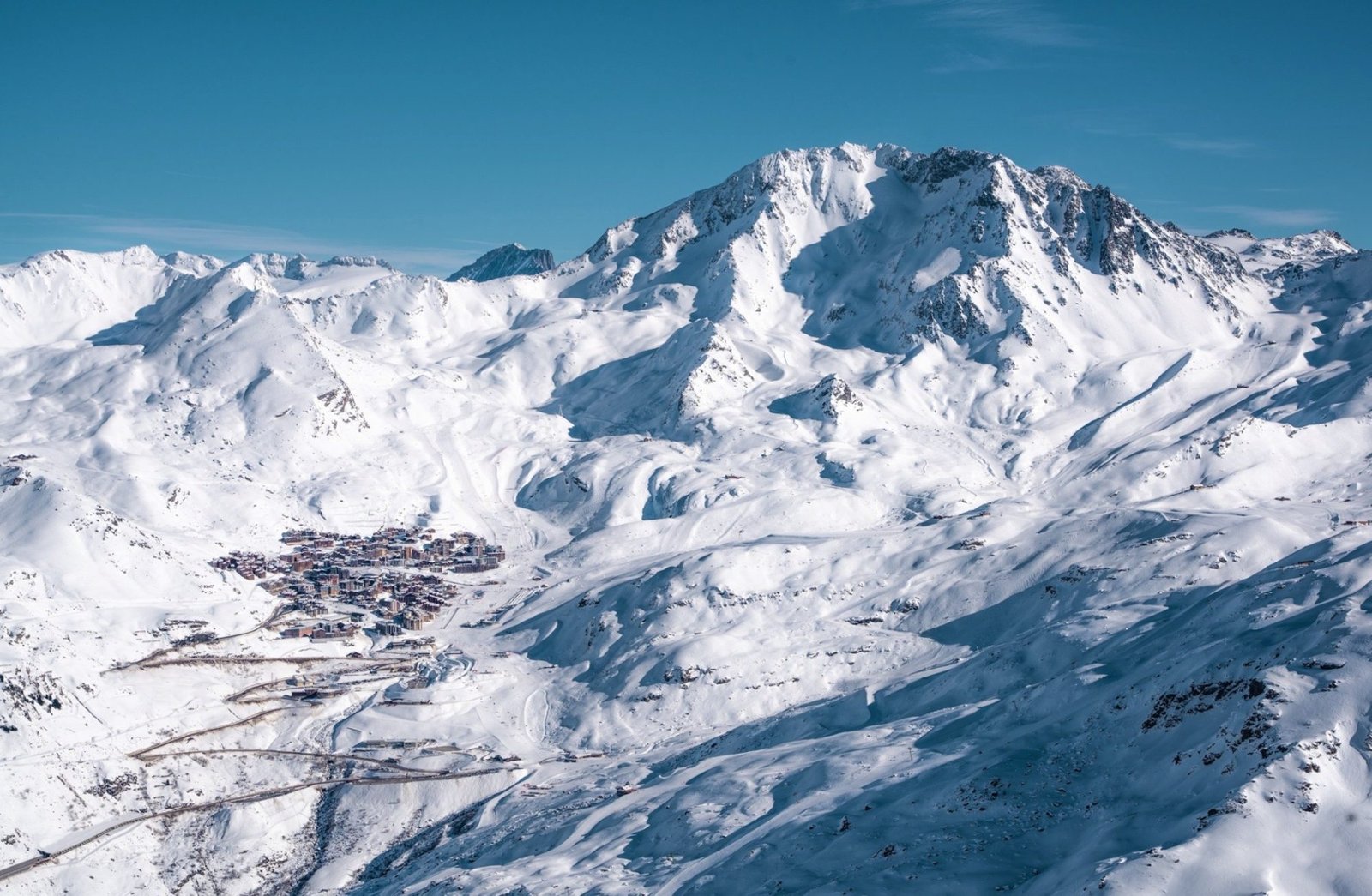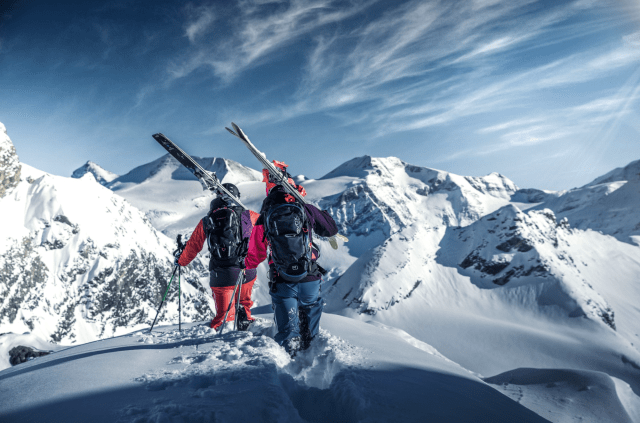With the media fuelling fears of less reliable snow cover at lower-lying ski areas, it’s no surprise that a regular survey conducted by The Ski Club of Great Britain found that, for the first time, skiers were putting the altitude range and snow-certainty of ski areas they were considering travelling to ahead of the extensiveness of its terrain.
Although they have not been keen to mention it in their “No Snow In The Alps Horror!” style reports, some skiers will have noticed that whilst there have been challenging times at low-lying centres sometimes, there have also been above-average snowfalls above 2000m altitudes over the past few seasons.
This Ski Club’s finding and the skier reaction to it is also being borne out by ski holiday companies and travel agencies who are finding strong demand for high altitude resorts.
“Bookings are overweighted towards the higher resorts (where there is skiing above 2000m even if the base resort is much lower) as skiers like to have some form of snow guarantee,” says Xavier Schouller who runs ski holiday companies Peak Retreats and Ski Collection.


© Les Menuires
Slope Orientation Factor
One thing to keep in mind behind the raw data on terrain above 2,000m is that being up high doesn’t necessarily mean snow is guaranteed. It does mean the odds of snow cover are generally higher, but factors like slope orientation (in the northern hemisphere snow usually melts faster on south-facing slopes), slope gradient and latitude of the ski area concerned can all impact snow cover to a greater or lesser extent.
“2000 m doesn’t mean the same in all parts of the Alps. There are glaciated mountains lower than 2500 m and non-glaciated ones well above 3,500m and the winter snowline also differs a lot depending on location,” confirmed expert Christoph Schrahe of Ski Weltweit who has spent many decades studying ski area cartography.
Weather And Trees
It’s also worth noting that most high-altitude terrain is above the treeline, so whilst the views are usually great on a clear day, they tend to be more prone to closure due to weather factors like strong winds or fog, when there tend to be fewer landmarks to guide your way, without the trees.
So which resorts have the most terrain up high? Well in many cases there is a correlation between the largest ski areas having correspondingly large amounts of terrain up high. However, some big areas don’t have much high terrain so they don’t make the cut, whilst a few resorts that don’t usually score so highly come nearer the top of the table as almost all of their terrain is above 2,000m. However, some of these are at southerly latitudes which can counter the altitude factor a little.
Ski Areas That Have The Most Terrain Above 2000m?


© alpesphotographies.com
It can be tricky to work out how much each ski area can offer above 2,000m. Wary of the media coverage of the danger of low snow cover at low altitudes, more and more ski areas in the Alps are saying they have X amount of terrain above 2,000m, usually as a % figure. But generally it’s just a stat mentioned in a publicity release, not part of their official ski area numbers.
Quite a few big players like the Swiss 4 Valleys around Verbier don’t publish a stat at all, others like the world’s biggest ski area Les 3 Vallées, have gone for their own altitude choice, saying 85% of their terrain is above 1800m, so it can be difficult to compare.
For InTheSnow we decided to try different approaches to get the over-2,000m-terrain stats for as many areas as we could. Our first approach was to ask the big areas directly. Then if there was no answer we went for the ever-reliable Google-search to see if the relevant stat was already out there. In other words, some of these claims may not be accurate. But here goes…
Les 3 Vallées, France, 400 km+ Above 2,000m (Probably)


© Paul Besson Les 3 Vallées
As mentioned, Les 3 Vallées claims 85% of their 600km of terrain is above 1800m altitude – so 510km. But how much of that 510km is above 2,000m? There’s no official stat, but we did ask the individual sectors at Les Menuires said 85% of their 160km (so 136km) is above 2,000m whilst various online sites claim either 90 or 99% of Val Thorens’ 150km of the terrain is above 2,000m (no surprise with the resort itself at 2,300m and slopes climbing to 3,200m above). If we split the stats and go for 95% that’s 142.5km or 278.5km of 310km – for a little over half of Les 3 Vallées. Alas, there are no figures for the Courchevel or Méribel Valleys. Even if we accept that the stats we do have include the region’s highest terrain, it looks like Les 3 Vallées not only had the most terrain overall in the world but probably the most above 2,000m too.
Matterhorn Glacier Paradise, Switzerland-Italy, 324 km Above 2,000m


© Zermatt & Marco Schnyder
After all the complicated maths to try to work out a stat for Les 3 Vallées Markus Hasler, CEO at Zermatt’s Bergbahnen AG kept it quick and simple saying, “Of the 360 km of pistes in Zermatt/Cervinia are 90% above 2000 m above sea level.” With Cervinia one of Europe’s highest ski areas at 2050m and the area open for snowsports year-round, with the highest ski lifts in Europe reaching 3,899m, it’s no surprise that the percentage is so high.
Via Lattea, Italy / France, 300 km Above 2,000m
One of the world’s largest ski areas with 400km of slopes spread across the Italian-French border, Via Lattea (or “The Milky Way” as it is sometimes known in its English translation) told us that 75% of these lie above 2,000m altitudes. The region is home to another of the highest altitude ski areas in Italy and the Alps, Sestriere at 2035m, as well as one of France’s highest natural resorts, Montgenèvre at 1860m. Via Lattea hosted the last Winter Olympics to be staged on European soil, back in 2006.
Paradiski, France, 298 km Above 2,000m


© La Plagne O Allamand
Online reports claim that 70% of the 425km of terrain above Les Arcs and La Plagne lies above 2,000m. It’s another ski region where you can choose to stay right up at 2,000m at either Arc 2000 (or almost there at Arc 1950 Le Village) on the Les Arcs side or centres like Aime 2000 and Belle Plagne and Plagne Soleil, both at an altitude of 2,050m, or the La Plagne side. Saying that, staying at any lower resort base and you have fast, comfortable uplift to the higher parts of the ski area anyway.
Engadin, Switzerland, 243 km Above 2,000m
Another tricky bit of guesstimate maths, but most of The Engadin’s 300km of slopes are made up of St Moritz’s various ski areas (some of which open in October and stay open through to late spring), and we found reference to 90% of the skiing there being above 2,000m. With the village itself sitting at 1850m and famous for its light Champagne powder with slopes up to 3,303m that all makes perfect sense!
Davos – Klosters, Switzerland, 240 km Above 2,000m
One of the world’s oldest ski areas with downhill skiing here dating back to the 19th century, Davos-Klosters has also grown into one of the world’s largest ski domains with 300km of slopes, 80% of which are reputed to be above the magic 2,000m point, and lifts climbing as high as 2844m.

Ischgl – Samnaun, Austria / Switzerland, 215 km Above 2,000m
Famed for its snow surety in Austria and the entire Alps, Ischgl starts and ends its long season from late November to early May each year with big music concerts on the mountain. Thanks to a mighty snowmaking arsenal it often has the most terrain open in the world, or thereabout when it starts its season, usually before most potentially larger areas have started theirs.
Serre Chevalier, France, 200 km above 2,000m


© alpesphotographies.com
One of the most southerly of the giant French ski regions, Serre Chevalier is keen to reassure those considering skiing there that 80% of its slopes, which climb up to 2800m, lie above 2,000m altitude, putting it just in the small group with 200km or more of high altitude terrain.
Tignes and Val d’ Isère, France, 180km above 2,000m
Surprisingly perhaps, despite Tignes and Val d’ Isère both being renowned for their long seasons from November to May, having high altitude bases and terrain up above 3,500m and make up two of the three French ski areas that still offer summer glacier skiing, only 60% of their huge 300km ski area is reported to be above 2,000m altitude.
Les 2 Alpes, France, 160 km above 2,000m
With terrain climbing up to 3,600m opening up one of the biggest lift-served verticals in the world at over 2,000m, as well as the longest ski season in France running from early December through to the following July (the final few months up on its glacier), Les 2 Alpes is indisputably one of the most snow sure resorts in the world.
Other Top Choices For Over 100km Of Over 2,000m High Altitude Terrain


© Andy Parant
Austria: Obergurgl (95% of 112 km = 107 km).
France: Chamonix Valley (90% of 150km = 135km); Isola 2000 (90% of 120km = 108km); La Rosière – La Thuile (60% of 155 km = 93km); Valmeinier – Valloire (70% of 150km = 105km); Risoul – Vars (83% of 185km = 154 km).
Italy: Livigno (90% of 115km = 104km).
Spain: Sierra Nevada (100% of 113km).
Switzerland: Laax (70% of 224km = 157km).
In addition, the areas below seemed like they might be in the world’s top 20 or 30 for most terrain above 2,000m but didn’t respond to the question, or did respond but said they couldn’t answer and we couldn’t find anything helpful online include:
Andorra: Grandvalira
Austria: Arlberg (Lech, St Anton). Serfaus-Fiss-Ladis, Sölden.
France: Alpe d’Huez Grand Domaine.
Italy: Monterosa.
Switzerland: Andermatt-Disentis-Sedrun; Arosa Lenzerheide, Crans Montana, Jungfrau (Grindelwald/Wengen),

There may well be others we’re forgetting.
Hopefully this winter no one will worry about altitudes anyway.
“We’re seeing favourite resorts which are lower show a reduction in bookings since the widespread rain at lower altitudes last winter. Memories can be short and it may only take one amazing winter to see fans desperate to go back,” concludes Richard Sinclair of ski travel agency Sno.co.uk.
Main Image © Val Thorens
InTheSnow Resort Guide
If you are looking for the perfect destination for your next trip, our Resort Guide has everything you need to know. You can check out our regular podcast here Apple | Spotify | Podcasts or search The Whiteout on your chosen podcast directory.




